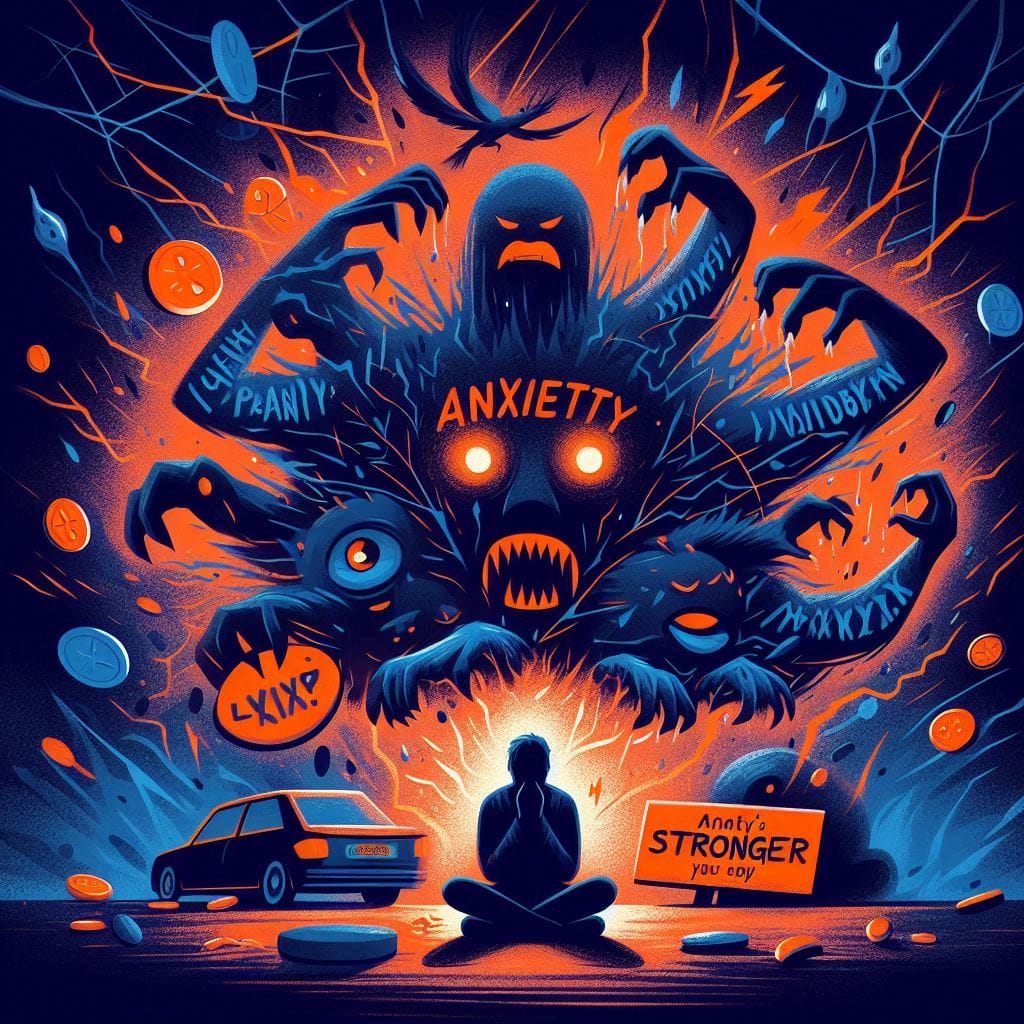10 Misconceptions About Anxiety — And Why It Makes Me Stronger Than Ever

When I first took up hiking, I was warned about the dangers lurking in the wilderness.
“Watch out for coyotes.”
“If you see a bear, stay calm.”
“And if you encounter a mountain lion… make yourself look bigger. Never show fear.”
That last piece of advice stuck with me. It wasn’t just about wildlife — it was a metaphor for survival in life.
Make yourself look bigger.
Never let them see your fear.
As a smaller woman, I had been practicing that advice long before I ever set foot on a trail. Walking home alone at night, I wore puffer jackets and heavy boots — an attempt to look more intimidating, less vulnerable. I made a point of opening my own jars so no one would say I needed to “man up.” I learned to speak confidently, even when I was uncertain, because appearing weak could be dangerous.
So when I was diagnosed with anxiety, I hesitated to tell anyone.
Because admitting anxiety felt like admitting weakness.
The Day I Told Someone… and Regretted It
A few months ago, I finally opened up to a friend and her boyfriend about my anxiety diagnosis. I had rehearsed how I would explain it, choosing my words carefully to sound composed and rational — not “too emotional.”
I expected support or at least understanding. Instead, her boyfriend shrugged and said,
“I don’t know, we all get nervous. I just think calling it ‘anxiety’ is overreacting. A little weak.”
That moment hit harder than I expected. I had been bracing myself for judgment, but hearing the word “weak” triggered a familiar knot in my stomach.
There it was.
The misconception that anxiety — a condition affecting 6.8 million adults in the U.S. alone — is just “nerves,” something you should be able to shake off with a little willpower.
10 Misconceptions About Anxiety — And the Truth Behind Them
Over time, I realized that this dismissive attitude wasn’t unique. The Centre for Mental Health Research identified ten common misconceptions about generalized anxiety disorder (GAD), and I’ve encountered nearly all of them.
Here’s what people get wrong — and why living with anxiety doesn’t make me weak. It makes me stronger than ever.
1. “Anxiety Isn’t a Real Medical Condition.”
The Myth:
Anxiety is often dismissed because we all experience nervousness or worry from time to time. If everyone feels anxious occasionally, how can it be a disorder?
The Truth:
Feeling anxious before a big presentation is not the same as experiencing chronic, overwhelming anxiety that interferes with daily life. Anxiety disorders involve persistent, excessive worry that’s often disproportionate to the situation — and it can affect everything from decision-making to sleep.
I didn’t “choose” to feel this way, just as someone with asthma doesn’t choose to struggle for breath.
2. “It’s Just in Your Head.”
The Myth:
Anxiety is seen as a mindset problem, something you can “think your way out of.”
The Truth:
Anxiety is not just mental — it’s physical. Racing heart, tight chest, dizziness, nausea. The body’s fight-or-flight system goes into overdrive, preparing for a threat that may not even be there.
Anxiety doesn’t just sit quietly in your mind. It hijacks your body, too.
3. “You Just Need to Relax.”
The Myth:
People assume that a few deep breaths or a yoga session can “cure” anxiety.
The Truth:
While relaxation techniques can help manage symptoms, anxiety isn’t something you can simply breathe away. It’s a complex interplay of brain chemistry, past experiences, and biological responses.
If solving anxiety were as easy as “just relaxing,” I wouldn’t have struggled in silence for so long.
4. “You’re Overreacting.”
The Myth:
Anxiety is often minimized as an exaggerated response to minor problems.
The Truth:
For someone with anxiety, even seemingly small situations can feel overwhelming because their brain perceives potential danger where others might not.
I’m not overreacting — my brain is working overtime to keep me safe.
5. “You’re Just Looking for Attention.”
The Myth:
Some believe anxiety is a way to seek sympathy or validation.
The Truth:
Most people with anxiety go out of their way to hide it. I spent years concealing my struggles because I didn’t want to be seen as weak.
Seeking help isn’t about wanting attention. It’s about survival.
6. “Anxiety Means You’re Weak.”
The Myth:
Anxiety is seen as an indicator of fragility, a lack of resilience.
The Truth:
Living with anxiety requires incredible strength. Imagine feeling like the world is on fire but still showing up, doing your job, and taking care of those around you.
Anxiety doesn’t make me weak. It makes me a warrior.
7. “You Just Need to Toughen Up.”
The Myth:
Many believe that anxiety can be overcome through sheer willpower — that people with anxiety just need to “push through.”
The Truth:
Anxiety isn’t a sign of weakness or lack of toughness. It’s a neurological response to perceived threats that can’t be silenced through brute force.
If anything, learning to navigate anxiety daily takes more resilience than people realize.
8. “Medication Is a Cop-Out.”
The Myth:
There’s a stigma around taking medication for anxiety, as though it’s an easy way out.
The Truth:
Medication doesn’t “cure” anxiety. It helps regulate brain chemistry, making it possible to engage in therapy, practice coping strategies, and regain a sense of control.
Taking medication isn’t giving up — it’s taking back power.
9. “You Shouldn’t Talk About It.”
The Myth:
Silence is often encouraged, either out of discomfort or a belief that talking about anxiety makes it worse.
The Truth:
Silence breeds shame. Open conversations about mental health break down stigma and empower others to seek help.
Talking about anxiety isn’t a weakness. It’s an act of courage.
10. “You’ll Never Be ‘Normal.’”
The Myth:
There’s a misconception that people with anxiety are destined to live a limited, fearful life.
The Truth:
Anxiety is part of my story, but it doesn’t define me. I’ve learned to navigate its challenges, and in doing so, I’ve discovered strengths I didn’t know I had.
I’m not broken. I’m evolving.
Why Anxiety Makes Me Stronger Than Ever
I used to think that managing anxiety meant erasing it. Now I know that strength lies in acknowledging it, understanding it, and channeling it into something powerful.
Anxiety has sharpened my intuition, making me hyper-aware of my surroundings. It has taught me resilience, forcing me to confront discomfort and push through fear. It has made me empathetic, allowing me to connect deeply with others who are also fighting silent battles.
Anxiety doesn’t make me weak.
It makes me courageous.
Every time I face a moment of panic and choose to keep moving, I’m proving that strength doesn’t mean the absence of fear — it means moving forward in spite of it.
So the next time someone tells me I’m “overreacting” or that anxiety makes me weak, I’ll remember the wild advice I once received about facing mountain lions:
Stand tall.
Make yourself bigger.
And never, ever let them see your fear.
Only now, I know…
True strength is owning that fear — and walking through it anyway.



